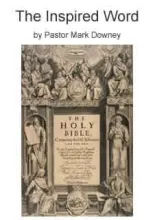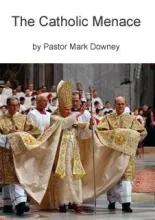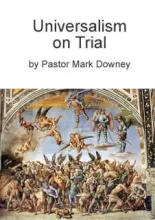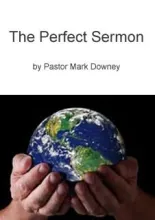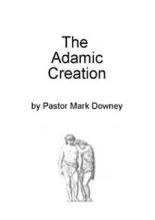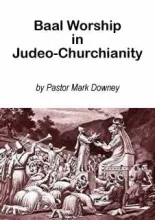The Unfortunate Gentile
by Pastor Mark Downey
Regrettably, the White race has an unwarranted legacy of being in the middle of a secular and religious expression that has authored a great deal of confusion. It has created a false identity with just one word: gentile. If you were to go to a public library that has one of those 20 pound dictionaries and looked up the word gentile, you would read its definition as "a pagan or heathen or someone who is not a Jew or a Christian". This, of course, would be unacceptable to the White Christian, especially if the truth be known that our race is the true Israel of Scripture and not jews or a spiritualized concoction of racially blind churches.
The intent of God's Word, before it was translated into English, revolved around a physical seedline of people. The word 'gentile' has created so much misunderstanding, that the wrong people are identified as to whom God has chosen to do His will upon the earth.
A refusal to acknowledge that other languages, ancient ones in particular, often loses the import of what is being said through translation; and even more so with the transition into other languages. Compound this with the fact that some words have more than one meaning.
The earliest manuscripts in existence date back to the 4th century A.D. Yet Moses wrote the first five books of the Bible sometime before 1400 B.C. That leaves approximately 1500 years of copying and as many years for transcribing errors. It would be foolish not to recognize that some of the original meaning of words has been lost. That's why Strong's Concordance often has "from an unknown source" or "probably a derivative of". Bible linguists will also tell you that it was almost impossible to translate some words into English as they do not sufficiently describe what is meant in the Hebrew or Greek.
Take the word 'man' for example. Generically it means mankind in general, including men and women. But, if it's used in the same sentence with the word 'woman', it means the male of the species. If it's used in the same sentence as the word 'boy', it means the mature of the species. Thus, we have three meanings of the word 'man' being determined by its use and context.
I most certainly do not mean to disparage the inspired Word written by the prophets or the apostles, but we need to understand the nature of language. Sometimes words were accidentally copied and sometimes words were planted intentionally to mislead. This forces the serious student of the Word to diligently work towards finding the truth and not just a cursory glance at isolated passages to formulate a teaching. For some people, this is too much and they will take the word of someone else to guide their beliefs. Don't take my word for this study on gentiles. Check it out for yourself. See if what the other proponents say harmonizes with Scripture or makes any sense. Ask yourself if God has changed His plans for man or is it man that has a plan to change God.
I'll be giving a few examples of how absurd the word 'gentile' can be. In fact, I'll say that the word 'gentile' shouldn't even be in the Bible. This is because the word is neither Hebrew or Greek, but rather from the Latin word 'gentilis', which results in the English transliterated word 'gentile'. The etymology of this word is a derivative of the Latin word 'gens', which meant nation or race. 'Gentilis' was used to describe any person who was not a Roman citizen and probably used in a derogatory manner. Thus begins the strained secular principle of something not belonging to the original i.e. someone from another country, being incorporated into biblical language. The word 'gentile' has no etymology in Hebrew or Greek and therefore it is arbitrarily inserted into the English translations.
What the translators did was to take the Hebrew word 'goi' or 'goy' (singular) and 'goyim' (plural) and the Greek word 'ethnos' (sing.) and 'ethne' (pl.) and put the word 'gentile' in whenever they could. The modern use of the word has come to mean non-Jew or non-Israel. This was not the intent of the Old and New Testament writers.
'Goy' is usually translated gentile, heathen, nation, people or another, according to Strong's. The Hebrew word 'goy' is a collective noun meaning nation or sometimes a collective body of people. Actually, there is no such thing as 'a gentile' as it is always plural and never an individual person. 'Goy' has been translated 375 times in the OT as nation(s) compared to 30 times as gentile(s); less than 10% of the time, signifying that it is not the primary use of the word.
It can be easily shown that the use of the word 'goy' (#1471) i.e. gentile and nation, are not interchangeable and in its first appearance in Genesis 10:5 we see an obvious inconsistency. It reads, "By these were the isles of the Gentiles [1471] divided in their lands; every one after his tongue, after their families in their nations [1471]." It wouldn't make much sense to say "in their Gentiles" and it would make much more sense to say "the isles of the nation". It should also be pointed out that if the word 'gentile' means a non-Jew or non-Israel, it should not appear in Scripture at this point in history, because Jacob-Israel is several generations away from being born.
It would cause much confusion about the Abrahamic Covenant, if 'gentile' were inserted into Genesis 12:2, "I will make of thee a great Gentile." Or Rebekah pregnant with Jacob and Esau having, "Two Gentiles in thy womb" (Gen. 25:23). It can only be nations (goy #1471) or would have been just as correct had it been translated 'tribes' or 'peoples'. The Bible student can experiment with hundreds of verses trying to place gentile for nations and it will not fit. 'Goy' was used in every instance in the original Hebrew.
It's also interesting to note from the Abrahamic Covenant in Gen. 12: 3 that, "In thee [Abraham's descendants] shall all the families of the earth be blessed." It is safe to say that all of Israel is of Adam, but not all Adamites are of Israel. Both are of the White race and the New Testament addresses both Adamites and the lost sheep of the house of Israel in the parable of the wild olive branch being grafted back in to the olive tree. The rhetorical question is asked and answered, "If the root be holy, so are the branches" (Romans 11:16). For example, the Adamic Vikings were converted to Christianity by their distant relatives, the Anglo-Saxon Israelites. The Adamic families or nations of the earth were being blessed by the Covenant People. Both could be considered 'gentiles' in the sense of race and/or nation(s).
Try 'Gentile' in Gen. 17:4-5, "And thou [Abraham] shall be a father of many Gentiles [or is it nations?]… for a father of many Gentiles [or is it nations?] have I made thee." 'Goy' is not necessarily Israelite nations, it just means nations. When God told Hagar that He would make her son a great nation [goy #1471], indeed Ishmael would be the progenitor of the Arab world. Exodus 34:24 has God casting out nations (goy #1471) in Israel to enlarge her borders. "Learn not the way of the heathen [nations - goy #1471]" Jer. 10:2.
Unfortunately, the status of Israel changed because they did go whoring after heathen gods. To use the popularized meaning of the word, they had become gentilized in the sense that they were no longer known as Israel. They had lost their identity. They were one nation or race that God had called out from among all the other nations and now she was just like the other nations. She had lost her heritage so much that Paul said that "blindness in part is happened to Israel, until the fullness of the Gentiles be come in" (Romans 11:25).
Let's look at some NT examples of the Greek word 'ethnos' (#1484), sometimes translated as Gentiles. With a few minor exceptions, this word meant members of a race, a tribe, or people having the same customs; or literally "nations" or "other nations", which is basically the same definition as the Hebrew word 'goy' used in the OT.
We must briefly mention the players on the stage of history at the time of Christ for clarification and encourage the Bible student to further investigate these people. There are basically four ethnic groups that need to be identified: 1. descendants of Canaan who had moved into Samaria after Israel was deported to Assyria; they resided in the area known as Judea along with the descendants of Esau and both were called "Jews" by virtue of being residents there; 2. descendants of those living in Jerusalem who were deported to Babylon, but later returned; they were referred to as "Jews" by virtue of being of the house of Judah (they should not be confused with Benjaminites residing in Galilee); 3. all other people, regardless of race, who lived in Judea, also called "Jews", who practiced the religion of Judaism; and 4. descendants of the house of Israel who went into Assyrian captivity and afterwards were known as 'the dispersed', because they had migrated and scattered throughout Europe, never to return to their homeland in the Middle East. Scripture generally refers to them as gentiles and Greeks. So we have a clear distinction between the first three and the last, racially and geographically. For further elaboration on jews, please read my article "The Antisemantics of the Word Jew".
Let's look at a few NT scriptures to see how the Greek word 'ethnos' has been translated. Two things should be noted from Strong's: 1. its first definition is "a race" and 2. the term "non-Jew" is italicized, indicating improper usage.
There should be no argument about how 'ethnos' is used in Luke 7:5, "He [the Roman centurion] loveth our nation [ethnos #1484], and hath built us a synagogue." If this had been translated "gentile" this verse would be very confusing, because the Jews had no love for any other nations or peoples. It took a vision from God to help Peter understand that he was to take the Kingdom message to Cornelius and other kindred peoples. It would have been illogical for the Jews (Judahites) to praise anyone for loving the 'gentiles' (non-Jews i.e. non-Israelites) and they wouldn't have tolerated the centurion building a meeting hall for the 'gentiles or another kindred peoples. But such was the case, because racially, the Judahites in Judea were the same people as the dispersed Israelites.
They had been separated over time by geography and at the time of Christ, were having what you might call a culture clash. They were both Israelites. However, at this time there is no real nation of Israel or Judah. Judea was under Roman occupation. Galilee, in contrast, which is where Christ delivered His ministry, was also under Roman rule, but not with a ruling body of Jews as in Jerusalem. It would seem to make a lot more sense if the 'ethnos' in Luke 7:5 had been translated "He loveth our people."
Luke has other discrepancies as we read 21:24 where 'ethnos' is translated "nations" once and "gentiles" twice. The translators probably did not understand how the people could "Be led away captive into all Gentiles", for obvious reasons. They should have been consistent and rendered 'ethnos' as "nations" in each of the three applications. Bullinger's Companion Bible makes the correction clear.
The national message of the Bible is that the tribes or nations of Israel are to administrate the Kingdom of God, not any other nation and not any other corporate institution such as the church proclaiming itself to be the key to the future of mankind. Christ had a conversation with one of these church supremacist, known as Pharisees and linked to the 'synagogue of satan'.
In John 7:34-35 these jews said among themselves, "Whither will he go, that we shall not find him? Will he go unto the dispersed among the Gentiles, and teach the Gentiles?" The first thing we should notice here is the word dispersed (diaspora #1290), also found in I Peter 1:1 and James 1:1, only refers to the houses of Israel and Judah who were scattered abroad from 745-715 B.C. The next important word under consideration in this verse is "Gentiles". Sometimes the word 'gentile' does not come from 'ethnos' as in this case, but rather from "Hellenes" (#1672), which is always translated Greek(s). It is then read as "The dispersed among the Greeks", meaning that these Jews knew that at least some of the lost sheep of the house of Israel were in Greece.
It is inconceivable that Christ would go among the dispersed and teach the Greeks and not the Israelites. This confusion is resolved if the phrase "dispersed among the…", which modifies "Greeks", is supplied to the second usage of the word "Greeks", thus rendered "teach the [dispersed among the] Greeks. Again, Bullinger, in his book "Figures of Speech Used in the Bible", makes the correction clear (p.998). The problem can also be resolved if the Greeks are, in fact, of Israel. "Among" also means "in" and "of". Therefore, this verse could also say, "the dispersed of Greece and teach the Greeks." So it may not necessarily be the dispersed among the Greeks, but the dispersed who ARE the Greeks.
This dovetails with other statements made by Christ i.e. "I was not sent but unto the lost sheep of the house of Israel" Mt. 15:24; "Go rather unto the lost sheep of the house of Israel" Mt. 10:6. The Greek word 'lost' as used here is appolumi (#622). It comes from two root words: 'apo', which denotes separation or to put away, and 'ollumi', which means punishment. This is exactly what had happened to the tribes or nations of Israel when they were banished into Assyria.
This explains why Caiaphas said, "That He [Christ] might also gather together into one the children of God that are scattered abroad" (John 11:52). No matter how you slice it, the Greeks and other European nations (ethne) were actually dispersed Israelites whose names or identity had been lost.
Probably the best example of misusing the word 'gentile' and proof that it is something other than the commonly mistranslated and misinterpreted meaning found in both secular and religious realms, is found in Romans, chapters 9 through 11. This is due to the fact that most scholars agree that these chapters pertain specifically to the nation of Israel, not the generalization of the 'gentiles'. Paul makes it pretty clear in 9:3-4, "My kinsmen according to the flesh [not spirit]: who are Israelites." It is amazing how universalists and/or denominationalists can rationalize that Paul is talking about something other than what he clearly states. If the Romans were gentiles, and if gentiles meant something other than Israelites, why would Paul call them gentiles as well as kinsmen of his own race in the preceding quote? It wouldn't make any sense.
There cannot be any spiritualization between Paul's relationships with the Romans. He was talking to his physical brethren by blood who were fellow Israelites. When he said to them, "Moreover, brethren, I would not that ye should be ignorant, how that all our fathers were under a cloud, and all passed through the sea" I Cor. 10:1. The Corinthians were the same as the Romans and Greeks, having their ancestry going back to Moses in the wilderness.
Paul continues to help us identify who's who, including himself, in Romans 9:24 by saying, "Even us, whom he also called, not from the Jews only, but also from the Gentiles." If we were to dispense with this confusing translation and replace it with what we have learned so far, it would be more easily understood as, "Even us… not from Judahites in Jerusalem only, but also from the dispersed nations of Israel." When Paul says, "Even us", he recognizes himself as a gentile or one of the dispersion. We know that Paul was born in the Roman province of Tarsus and yet he was an Israelite from the tribe of Benjamin (Romans 11:1). The Bible student can begin to rightly divide the word of truth with these simple keys. The inferior expressions of "Jew" and "Gentile" can be replaced with far superior words.
The separation of Israel goes back to the split between the northern and southern houses of Israel and Judah. The resulting terms in our Bibles became "Jew" and "Gentile". These two words, unfortunately, morphed into something other than the aforementioned. Even though Israel splintered and became estranged from each other, God has made provisions for reconciliation between the two with our Mediator of the New Covenant, Jesus Christ. "Behold, the days come, saith the Lord, when I will make a new covenant with the house of Israel and with the house of Judah" Heb. 8:8. This covenant is not made with any other race nor was it made with any particular church.
After Israel split into two houses, each house would refer to the other house as 'goy', the Hebrew word meaning 'nation' as well as race or people. Judeans in the days of Christ referred to the dispersed brethren of Israel as 'goyim' (gentiles). Today, those who call themselves jews, but have zero ancestry with either Judah or Israel, erroneously call true Israelites i.e. White Christians, either gentiles in a generic sense or goyim in a derogatory sense. They've exploited these words as a contrast to biological jews (primarily Ashkenazi and Sephardic jews) and practitioners of Talmudic Judaism.
When we see the phrase "Gentiles in the flesh" in Ephesians 2:11, it is describing Israelites who were no longer of the Circumcision, but divorced, dispersed and scattered by God. In verse 12 we see, "at that time" referring to "in time past" (or in the past) of verse 11, meaning from the time of their divorce and dispersion until the time of Christ, they were "Aliens from the commonwealth of Israel" and "Strangers from the covenants." Verse 13 gives us the identity of who was "far off and made nigh", being Israel. Daniel understood this seeming paradox of Israel being both far off and near geographically when he prayed, "To the men of Judah, and the inhabitants of Jerusalem, and unto all Israel, that are near, and that are far off [dispersed], through all the countries whither thou hast driven them, because of their trespass" Daniel 9:7. Paul and Daniel understood the same thing, that although these people were of the same race, they were in different nations geographically.
Now some Bible students may think that this was the end of the story for Israel and she just amalgamated with other nations or disappeared. What some people fail to understand is that God had a plan to regather both houses as one nation (the two sticks of Ezekiel). Israel was alienated, not in the sense that they became racial aliens, but rather as a result of their disobedience to God. Christ died so that He could redeem His people from this condition. Indeed, with the Lord's death and resurrection, they became redeemed and re-covenanted to God.
While Israel was paying the price for their sins in the post-captivity period, a fine line developed between them and heathenism. It's not that they became heathens or lost their genetic integrity, but rather that they acted like heathens or emulated other races. The analogy could be made today with young White boys copying Negro behavior and called 'wiggers'. They have become heathen just as much as their ancient ancestors, albeit they remain the same race or 'ethnos'. The Negro is a heathen by virtue of his race, not emulation.
This can be very confusing if we do not understand how to rightly divide the word of truth. Here again, the Greek word for Gentiles is ethnos, which can also mean the heathen or uncircumcised. When they had lost their faith and heritage, they no longer practiced the Mosaic Law, statutes and ordinances. As explained earlier, the words goy and ethnos can be applied to either Israel or alien nations, but the majority of times it is in reference to Israel.
If someone does not know how to discern the difference between an Israelite who has become paganized like heathens and real heathens or non-Israelites, then they will quickly become confused and led to false teachings. Let's not twist Paul's use of the word "heathen" in Galatians 3:8, "And the scripture, foreseeing that God would justify the heathen through faith", because he is talking about the status of divorced paganized Israel, not aliens of another race. The evidence is in the continuation and context of the rest of the verse, "Preached before the gospel unto Abraham, saying, in thee shall all nations be blessed." This was the covenant God made exclusively with Abraham and his descendants in Jacob-Israel. The word "heathen" and "nation" in this verse are both ethnos #1484 and apply to the same race of people.
A Pharisee might want to play word games and go to another Bible version and superimpose it over the KJV; such as Acts 15:14 where the KJV says, "How God at the first did visit the Gentiles, to take out of them a people for His name" and then compare it to the Ferrar Fenton Bible, where it says, "First turned to choose from among the heathen…". Reading these two renditions, one could get the superficial impression that God is giving His name to someone other than Israel. However, ethnos is the Greek word used for both "Gentile" and "heathen" in both Bibles. We know that from II Chron. 7:14, "My people, which are called by My name…" is none other than Israel and that verse 16 confirms the perpetuity as God declares, "For now I have chosen and sanctified this house, that My name may be there for ever."
In most cases ethnos #1484 is referring to the people of a nation. While the word "heathen" has been so translated 5 times from #1484, there's another Greek word 'ethnikos' #1482, which means "national ethnic", suggesting a nation of a particular race. This word is only used twice. In Mt. 6:7, Christ tells us that when we pray, we should not use vain repetitions as the heathen do. Hare Krishna's emanate from India and are known for their mantras repeated over and over again. The rosary was employed in ancient Babylon, the pagan Orient and in the Egyptian mysteries. White people engaged in the New Age movement and White people practicing Catholicism is the principle in which Christ admonishes His people to avoid. When our people go outside their own ethnic heritage, they become lost, as happened to ancient Israel, and lose their identity.
In Mt. 18:15-17, Christ uses #1482 in conjunction with due process of law among "thy brother" meaning a fellow Israelite and that if those kindred failed to reconcile their disputes, they were regarded the same as a heathen (ethnikos - somebody of another race from another nation).
And then there are those who love to point out contradictions in the Bible, when it is they who are contrary to God. They'll compare the previous scripture in Acts to Mt 10:5 and say "See! It can't be both ways." Well, not to one who is unilaterally minded and arbitrarily insists upon one word fits all (such as gentile).
Mt. 10:5 is an important passage because it is telling us that we White Christians are not supposed to go to a certain people. It tells us, "Go not into the way of the Gentiles, and into any city of the Samaritans enter ye not." Some would argue that it's talking about two groups of people here, because of the article "and", however, not only does the context become clear in the next verse as Jesus tells His disciples to "Go rather to the lost sheep of the house of Israel", but Ferrar Fenton omits the word "and" in verse 5, suggesting that Gentile/heathen and Samaritans are one and the same thing. In other words, they are racially not of Israel.
One can determine the intellectual dishonesty of how someone proves something by taking a verse out of context. Paul was not creating an anomaly nor making God to flip-flop. He was making a contrast between Israel and non-Israel in chapters 9, 10 and 11 in Romans. It was a contrast between Israel in 975 B.C. and Israel known as nations in A.D. 60. The "Fullness of the Gentiles" (Romans 11:25) should be "fullness of nations", which leads directly back to Gen. 48:19 of God's covenantal promises where Ephraim was to become a "multitude of nations" and be a blessing to his own kind. Would God break His own covenant or contract and all of the sudden switch to alternative parties? We've heard that we shouldn't cast our "pearls before swine" or unclean ingrates, but an often missed racial discrimination precedes it with, "Give not that which is holy unto the dogs" (Mt. 7:6). This is speaking figuratively of the heathen type of persons of whom God disdainfully warns us. It is the stranger who is not thy brother and/or the emulation thereof.
"Let God be true and every man a liar." The whole integrity of Jesus Christ rests upon His ability to keep and fulfill the covenant that He has made with our forefathers. From the New Century Translation of Hebrews 6:17, "God wanted to prove that His promise was true to those who would get what He promised. And He wanted them to understand clearly that His purposes never change, so He made an oath. These two things cannot change: God cannot lie when He makes a promise, and He cannot lie when He makes an oath. These things encourage us who came to God for safety. They give us strength to hold on to the hope we have been given." God's oath was confirmed through Abraham. If you finish reading this chapter, you'll see that it was the descendants of Abraham who are the only people anchored in the hope that our High Priest after the order of Melchisedec, Jesus Christ, who has entered the inner veil for us. This is in reference to the old Levitical priests being replaced by, "What? Know ye not that your body is the temple of the Holy Spirit which is in you" (I Cor. 6:19). Melchisedec represents the king and priest that is in every Israelite (Rev. 1:6). The divine mandate to take dominion of the earth does not diminish because of a word like 'gentile' being adulterated.
Indeed, the blindness upon our people is being lifted by a mighty movement of God as our real identity and the identity of other nations is becoming known. There's a frenzy of 'whited sepulchers' behind the veil of a church that demonize this Identity message. Their days are numbered and desperate. The end of gentile-pushers is in sight. "He [the Lord] will destroy in this mountain [kingdom] the face of the covering cast over all people, and the veil that is spread over all nations" Is. 25:7. The Kingdom of Heaven suffers from violence now as much as it did with John the Baptist and "the violent take it by force" (Mt. 11:12).
For 2000 years ecclesiastical authority has violently distorted and misrepresented the Word of God by forcing the dictates of man upon the 'lost sheep'. "Beware of false prophets, which come to you in sheep's clothing, but inwardly they are ravening wolves" Mt. 7:15. The unfortunate gentile is the false nation that God never gave to any prophet or modern expositor.
The biblical ethnos of true Israel has been supplanted with an assortment of self serving definitions. From antichrist Judaism, that puts forth the lie that ethnos means gentile and gentile means someone who is not a jew, to the abomination of universalism that spiritualizes ethnos to mean any race can become an honorary Israelite, to the pernicious church establishments wanting their piece of the pie in the sky, saying ethnos is the membership of their corporation. They are all wrong, because first and foremost ethnos means race and that race can only be one people, not those who killed Christ, not the mongrel hoards and not the priestcraft of self will.
The advocates of phony gentilism would and must have you believe that God lies, changes His promises and does not honor His Covenants. It's pure blasphemy to manipulate God's intent away from the rightful heirs of His Word. The purposes of Christ coming to His own are certainly no mystery to those who read, believe and obey the whole Bible. Did Jesus Christ nullify the covenants made exclusively to Israel upon the cross or somehow transform the purposes to which Israel was called, chosen and ordained to perform into a racially homogenized corporate institution called the church? This false concept is nowhere to be found in the Bible. There are special socio-economic interests that do not want White people administrating the Laws of God in their own Israelite nations and therefore support apostate churches who teach obedience to the secular laws of the land.
"How long halt ye between two opinions? If the Lord be God, follow Him; but if Baal, then follow him, and the people answered him [Elijah] not a word" I Kings 18:21. How much longer must White people vacillate between God's decree of Israel's destiny and modern Baals? The Christian Identity message stands in the gap and answers that question: we once were lost but now are found. "Yet the number of the children of Israel shall be as the sand of the sea, which cannot be measured; and it shall come to pass, that in the place where it was said unto them, ye are not My people, there it shall be said unto them, ye are the sons of the living God" Hosea 1:10.
Only a stiffnecked people could fail to recognize themselves a God's Covenant People yesterday, today and tomorrow. May the burden upon our necks be lightened with the yoke of His mercy, lest we continue as the unfortunate gentile.
- Log in to post comments

 "For thou art an holy people unto the Lord thy God: the Lord thy God hath chosen thee to be a special people unto himself, above all people that are upon the face of the earth."Deuteronomy 7:6
"For thou art an holy people unto the Lord thy God: the Lord thy God hath chosen thee to be a special people unto himself, above all people that are upon the face of the earth."Deuteronomy 7:6
